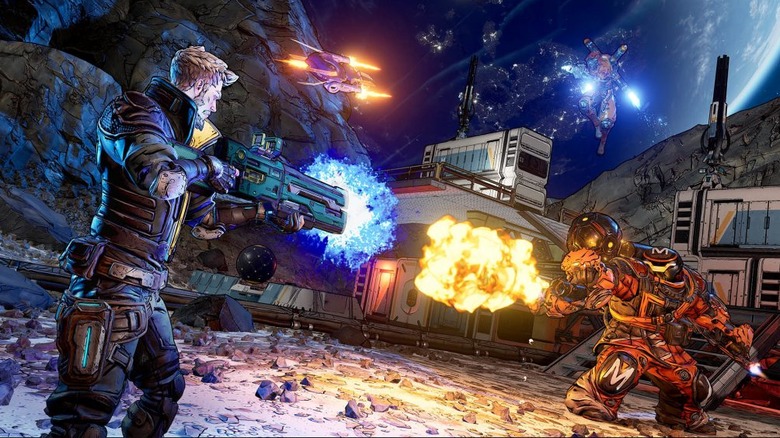Borderlands 3 Employees Are Causing An Uproar
Since its release last September, Gearbox's Borderlands 3 has been a massively popular game. As of last month, the game had sold nearly 8 million copies worldwide, with around 5 million of those copies having moved within just the first week of sales. Despite this however, Kotaku is reporting that the developers behind the game are not being paid the bonuses they were expecting.
A few Borderlands 3 developers who have asked to remain anonymous have come forward to complain about a recent meeting with Gearbox CEO Randy Pitchford that did not go at all how they'd hoped. Though the developers had been promise "six figure bonuses" for their work on Borderlands 3, Pitchford informed them that they'd be paid significantly less.
Gearbox issued a statement on the situation to Kotaku regarding the situation, which reads, "Borderlands 3 represents an incredible value to gamers and an incredible achievement by the team at Gearbox Software. Our studio is talent-led and we believe strongly in everyone sharing in profitability. The talent at Gearbox enjoys participation in the upside of our games – to our knowledge, the most generous royalty bonus system in AAA. Since this program began, Gearbox talent has earned over $100M in royalty bonuses above and beyond traditional compensation."
As Kotaku points out, Gearbox's employees are not paid particularly competitive salaries, so many of them tend to count on the royalty program to make up for that fact. With this in mind, the fact that Borderlands 3 hasn't ended up being quite so profitable for them must come as a heavy blow. Even putting aside the fact that the game was apparently produced without the amount of "crunch" that often comes with modern AAA titles, it's still must be frustrating to feel that so much hard work was more or less in vain.
Gearbox's statement continues, "In the most recent pay period Gearbox talent enjoyed news that Borderlands 3, having earned revenue exceeding the largest investment ever made by the company into a single video game, had officially become a profitable video game and the talent at Gearbox that participates in the royalty bonus system has now earned their first royalty bonus on that profit. Additionally, a forecast update was given to the talent at Gearbox that participates in the royalty bonus to set expectations for the coming quarters. Gearbox is a private company that does not issue forward looking statements to the public, but we do practice transparency within our own family."
That's a lot of flowery language to reiterate that Gearbox does, in fact, have a royalty system. However, this statement also sort of sidesteps the issue. People aren't insinuating that Gearbox isn't giving bonuses to their staff. The problem here is that the people who worked on the game are receiving significantly less than they were made to expect.
In addition, it appears that several employees were made to feel expendable. During the meeting, Randy Pitchford allegedly told the developers present that they were more than welcome to find a job somewhere else if they were unhappy with their royalty bonuses. The problem seems to come back around to the fact that the game was simply far too expensive to produce. The game apparently hasn't made enough of a profit for the company to deliver on the royalties it told developers to expect.
This isn't the first time that Gearbox, and Randy Pitchford in particular, has been the focus of payment-related drama. Former Gearbox lawyer Wade Callender filed a lawsuit against Pitchford and claimed that the CEO had misappropriate $12 million in company funds, allegedly pocketing a bonus that was meant to go towards the production of Borderlands 2. Callender was likewise accused of misusing company funds. The suit was eventually dismissed and both parties signed non-disclosure agreements, so nobody exactly knows how the issue was resolved.
However, these accusations have been echoed by Gearbox's former VP of business development and the original voice actor for iconic Borderlands character Claptrap, David Eddings. In 2018, it was reported that Eddings wouldn't be reprising his role as Claptrap, explaining that he felt he wasn't being paid fairly for his time and work in the recording booth. It was later revealed that he also left the company following a physical altercation with Pitchford.
In other words, folks not getting paid seems to be turning into a running theme at Gearbox. It can be a little difficult to navigate or predict ins and outs of how these royalty systems could or should work, but one thing's for sure: the people who worked diligently on publisher 2K Games' fastest selling game of all time are not happy with their compensation.

